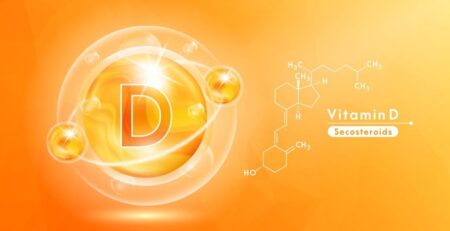Vitamins For Eustachian Tube Dysfunction: How Vitamins B, C, and D Can Make a Difference
Eustachian tube dysfunction, characterized by symptoms such as ear pain, muffled hearing, and a feeling of fullness in the ear, can significantly impact one’s quality of life. While various treatments exist, it’s crucial to explore the role of vitamins in maintaining overall ear health.
This blog will delve into the potential benefits of vitamins B, C, and D in managing Eustachian tube dysfunction.
Discover how these essential nutrients can support nerve function, immune response, and inflammation reduction, and learn how to incorporate them into your daily routine for improved ear health and function.
Role of Vitamin B in Eustachian Tube Health
The Vitamin B complex comprises eight water-soluble vitamins critical in various bodily functions, including energy production, cell growth, and maintaining a healthy nervous system. These vitamins are
- B1 (thiamine)
- B2 (riboflavin)
- B3 (niacin)
- B5 (pantothenic acid)
- B6 (pyridoxine)
- B7 (biotin)
- B9 (folic acid), and
- B12 (cobalamin)
Importance of Vitamin B for Nerve Function and Circulation
Vitamin B, particularly B6, and B12, is essential for maintaining healthy nerve function and promoting blood circulation.
These vitamins aid in the production of myelin, the protective sheath around nerve cells, and help regulate the levels of the amino acid homocysteine, which is linked to various health issues, including hearing problems.
Proper nerve function and circulation are vital for optimal ear health and may help prevent or alleviate Eustachian tube dysfunction symptoms.
How Vitamin B May Help Alleviate Eustachian Tube Dysfunction Symptoms?
Vitamin B may help reduce inflammation and promote the proper functioning of the Eustachian tubes by supporting nerve function and circulation. Inflammation can cause the Eustachian tubes to become blocked, leading to dysfunction.
Ensuring adequate Vitamin B intake may help alleviate symptoms such as ear pain, muffled hearing, and a feeling of fullness in the ear.
Food Sources and Supplements Rich in Vitamin B
Vitamin B is found in a variety of food sources. Some excellent options include whole grains, lean meats, poultry, fish, eggs, dairy products, nuts, seeds, legumes, and leafy green vegetables.
In addition to these food sources, Vitamin B supplements are also available in various forms, including tablets, capsules, and liquid drops.
Recommended Daily Intake and Potential Side Effects
The recommended daily intake of Vitamin B varies depending on the specific vitamin, age, and sex. It’s essential to consult with a healthcare professional to determine the appropriate dosage for your individual needs.
Generally, Vitamin B is considered safe when recommended, but excessive intake can lead to side effects such as gastrointestinal issues, skin flushing, and nerve damage. Always follow the advice of a healthcare professional when considering supplementation.
Vitamin C: A Natural Antioxidant for Eustachian Tube Support
Vitamin C, also known as ascorbic acid, is a water-soluble and potent antioxidant that plays a crucial role in many bodily functions. It is necessary for collagen production, wound healing, iron absorption, and maintaining healthy teeth, gums, and blood vessels.
As an antioxidant, Vitamin C protects cells from damage caused by free radicals, which can contribute to chronic diseases and aging.
Role of Vitamin C in Immune System Support and Reducing Inflammation
Vitamin C is essential for a robust immune system, as it helps stimulate the production of white blood cells that fight infections. It also supports the function of the skin and mucous membranes, which act as barriers to protect the body from pathogens.
Additionally, Vitamin C has anti-inflammatory properties that can help reduce inflammation in the body, including within the Eustachian tubes.
How may Vitamin C Contribute to Eustachian Tube Health?
By bolstering the immune system and reducing inflammation, Vitamin C can play a significant role in maintaining the health of the Eustachian tubes.
A strong immune system is better equipped to prevent infections that could lead to Eustachian tube dysfunction. At the same time, reduced inflammation can help alleviate symptoms associated with the condition, such as pain and pressure in the ear.
Food Sources and Supplements Rich in Vitamin C
Vitamin C is abundant in fruits and vegetables, including oranges, strawberries, kiwi fruit, bell peppers, broccoli, kale, and spinach. Since the body cannot produce or store Vitamin C, consuming foods rich in this nutrient daily is essential.
Vitamin C supplements are also available in various forms, such as tablets, capsules, chewable, and powders, for those who may struggle to meet their daily requirements through diet alone.
Recommended Daily Intake and Potential Side Effects
The recommended daily intake of Vitamin C varies depending on age and sex. For adult men, it’s 90 mg per day, and for adult women, it’s 75 mg per day. Pregnant and breastfeeding women require higher amounts.
While Vitamin C is generally considered safe when recommended, excessive intake can lead to side effects such as diarrhea, nausea, and abdominal cramps. It is crucial to consult with a healthcare professional before starting any supplementation regimen.
Benefits of Vitamin D for Eustachian Tube Function
Vitamin D, a fat-soluble vitamin, is vital in maintaining bone health, immune system regulation, and cellular growth. It is unique among vitamins because the body can produce it when the skin is exposed to sunlight.
Vitamin D is essential for absorbing calcium and phosphorus, which are necessary for strong bones and teeth.
Significance of Vitamin D in Bone Health and Immune System Regulation
Vitamin D is crucial for bone health, as it helps prevent conditions such as osteoporosis and rickets. A deficiency in Vitamin D can result in weakened bones, which can ultimately affect the ear’s tiny bones, leading to hearing problems.
Moreover, Vitamin D has a role in immune system regulation, helping to protect the body from infections, including those that could cause Eustachian tube dysfunction.
How may Vitamin D improve Eustachian tube Dysfunction Symptoms?
Vitamin D’s contribution to bone health and immune system regulation can positively impact Eustachian tube function. Adequate Vitamin D levels may help prevent infections leading to Eustachian tube dysfunction and maintain the ear’s structural integrity.
Furthermore, recent studies suggest that Vitamin D may have anti-inflammatory properties, potentially alleviating symptoms associated with Eustachian tube dysfunction.
Food Sources and Supplements Rich in Vitamin D
Vitamin D is naturally present in a limited number of foods, including fatty fish (such as salmon, mackerel, and sardines), beef liver, egg yolks, and cheese. Some foods, such as milk, orange juice, and breakfast cereals, are also fortified with Vitamin D.
Sunlight is another source of Vitamin D, but factors like skin pigmentation, sunscreen use, and geographical location can affect its production.
Supplements are available in various forms, including tablets, capsules, and liquid drops, for those who may have difficulty obtaining adequate amounts of Vitamin D through diet and sun exposure.
Recommended Daily Intake and Potential Side Effects
The recommended daily intake of Vitamin D varies depending on age, sex, and life stage. Generally, it is 600 to 800 IU (International Units) per day for most adults.
It’s crucial to consult with a healthcare professional to determine the appropriate dosage for your individual needs. Vitamin D is generally considered safe when recommended, but excessive intake can lead to side effects such as nausea, vomiting, constipation, and even kidney damage.
Always follow the advice of a healthcare professional when considering supplementation.
Integrating Vitamins B, C, and D into Your Daily Routine

Creating a Balanced Diet to Incorporate these Essential Vitamins
To ensure you are getting adequate amounts of vitamins B, C, and D, it’s necessary to maintain a balanced diet that includes a variety of nutrient-dense foods.
Aim to consume plenty of whole grains, lean meats, fish, poultry, eggs, dairy products, nuts, seeds, legumes, and colorful fruits and vegetables. Incorporating a diverse range of foods into your meals can help support Eustachian tube health and overall well-being.
Role of Supplements and How to Choose the Right Ones
While it is ideal to obtain vitamins through your diet, supplements can benefit individuals who have difficulty meeting their daily requirements or have specific medical conditions. When choosing supplements, look for high-quality products tested for purity and potency.
Ensure reputable manufacturers make them and follow the recommended dosages. It’s crucial to consult with a healthcare professional before starting any supplementation regimen, as they can provide personalized guidance based on your individual needs and medical history.
Potential Interactions and Precautions When Taking Multiple Vitamins
When taking multiple vitamins or supplements, it’s essential to be aware of potential interactions and precautions. Some vitamins and minerals can compete for absorption or have synergistic effects, affecting their efficacy.
For example, taking large doses of Vitamin C can interfere with the absorption of Vitamin B12, and taking calcium supplements may reduce the absorption of Vitamin D if consumed simultaneously.
To avoid potential interactions and ensure you get the most out of your vitamins, consult a healthcare professional for guidance on proper dosing and timing.
Conclusion
Vitamins B, C, and D support Eustachian tube health and function, potentially alleviating dysfunction symptoms. Maintaining a balanced diet and incorporating these essential nutrients can promote better ear health and overall well-being.
Remember to consult with a healthcare professional before starting any supplementation regimen and to adopt a holistic approach to managing Eustachian tube dysfunction.
By combining proper nutrition, exercise, and stress management, you can work towards improved ear health and a higher quality of life.












Leave a Reply